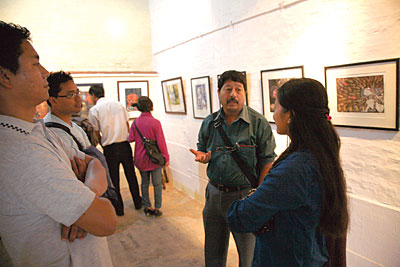 MIN RATNA BAJRACHARYA |
Last Friday, after participating in a literary event in the starched environs of the the Nepal Bharat Library in New Road, I made my way to a Jhamel bookshop only to find the space below it crammed with those present for the opening of an art exhibition by Ragini Upadhyay. After once more confirming that had I the time, I'd love to spend a year held hostage in this particular bookshop, I ran across to Yala Maya Kendra, where Bhaskar Dhungana was previewing his short movies. The rain began, relentless, but could not prevent us from stumbling through running streets and dripping eaves to finally arrive at a Newari bhoj in Chyasal, that warren to the east of Mangal Bajar.
I was bemused (and entertained) by the range of events on offer that weekend. Doubtless, people across the Valley were congregating in other galleries, bars, restaurants, cinema halls, malls and public spaces, the totality of their experiences making for a panorama of what you can do in Kathmandu on any given day. These days, things have moved on somewhat from the time arented VHS tape from Suwal was occasion for the entire joint family to sprawl across straw mats and while away a Saturday, and even that would have represented an advance on your generic Kakani banbhoj, or picnic. As I've noted before in this space, the world has come to Nepal, and Nepal is making its own world at least as far as culture � high and low � is concerned.
But is our latterday cornucopia of consumption really so much of an advance? Far be it from me to bemoan all the choices available to one, but what is the opportunity cost involved in choosing how to spend one's time (and money)?
It's not only a matter of choosing between a book launch, an art exhibition, a movie. It could be between the above and a get together with friends, getting on with that hobby (which one?), and a good old-fashioned dalbhat with family. Too often, the more conventional timepasses are passed on in the name of keeping abreast with what's new.
Does this mean less of the old? Inevitably. Our mental architecture is as clogged as the Kathmandu Valley. But just as we must provide for parks and public spaces where the old can breathe with the young, we must carve out � and the violence of that expression is exactly what is intended � space within our busy lives to accommodate what we value from the past. Either something has to be given up, or something will give, by which time it is usually too late to go back. That field where you played seven-stone as a child will be gone, and your parents whom you don't have the time for will be gone, and in your incessant bustling about in a future-oriented present, all you'll have of the past will be a few photos someone else has uploaded onto Facebook.
In the brave new world of Nepal, every activity is geared towards achievement, making a difference (for oneself), or partaking of something worthwhile. Perhaps we can't all be renaissance men (and women). Perhaps there is some worth in spending the day playing cards after all. If you still remember how to do that.



